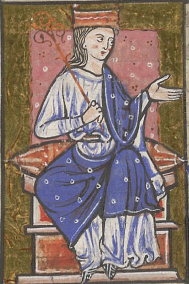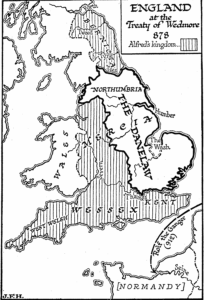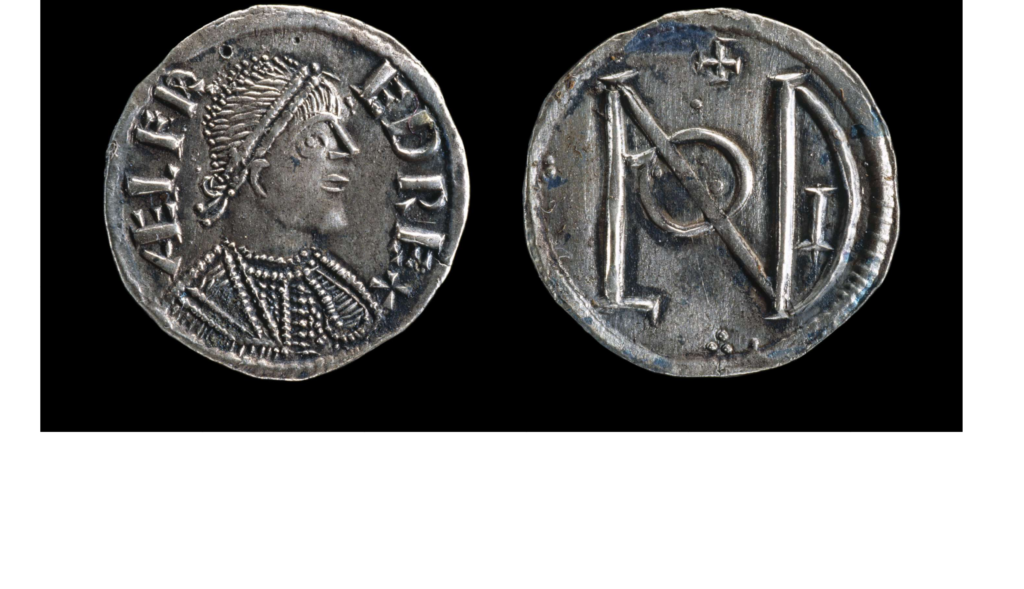Aethelflaed, Saxons, Danes, and The Last Kingdom
Over the last few weeks, it seemed like almost everyone I knew was watching or had watched The Last Kingdom: a British television series based on Bernard Cornwell’s historical novels The Saxon Stories. It is set in Britain in the late eighth and early ninth centuries, when Alfred the Great* (and his adult children) defended their kingdoms against Norse invaders.
Several people mentioned that Aethelflaed, the Lady of Mercia whom I discussed in Women Warriors, enters the story in season two. They also mentioned that they were finding it hard to keep the underlying history of the Danes and the Saxons straight. Allow me to help, with an emphasis on Aethelflaed, whose role in the story is often not given a fair share of attention and is sometimes left out all together.
Beginning in 793, Viking raiders arrived in England each spring, as regularly as robins, and attacked the coasts and inland waterways of the British Isles. Over time, Viking raids evolved into permanent Danish settlements. By the end of the ninth century, the area known as the “Danelaw” covered a significant portion of England, from the north of Yorkshire to the Thames.
Alfred the Great (who reigned from 871-899) successfully defended the kingdom of Wessex against Viking attackers, but realized he could not drive them out of England entirely. In 886, he negotiated a treaty with the Danes, which left northern and eastern England under Danish rule and returned West Mercia and Kent to Anglo-Saxon control. I suspect you will not be surprised to learn that neither side honored the treaty, though it did slow down action across the border for a few years.
At the same time that he negotiated a treaty with the Danes, Alfred also built alliances with his Saxon neighbors. His most important ally was Aethelred, Lord of Mercia. In order to strengthen the alliance, Alfred arranged for his daughter and eldest child, Aethelflaed, to marry Aethelred.
We know little about Aethelflaed’s life until the first years of the tenth century, when Aethelred became ill. With no direct male heir waiting to inherit Aethelred’s crown, Aethelflaed became the effective ruler of Mercia during her husband’s illness. When he died in 911, she succeeded him without opposition—the only female ruler in the Anglo-Saxon period in England and one of only a handful of women in early medieval Europe who ruled in their own right rather than as a regent for an underaged son or brother. (The fact that Aethelfaed’s mother, Ealhswith, was a daughter of the royal house of Mercia may have played a role in the Mercians accepting her as their ruler.***) Aethelflaed was the Lady of the Mercians, just as Aethelred had been Lord of the Mercians before her. (Don’t let the title fool you. Aethelflaed was a ruling queen by any standard.)
In 917, the conflict between Anglo-Saxons and Vikings intensified. The West Saxon chronicles tell us that Aethelflaed’s younger brother, Edward the Elder, who had succeeded their father as the King of Wessex, occupied the Danish border town of Towcester, in modern Northamptonshire, shortly before Easter. In July, a Danish force counterattacked. By year’s end, the Viking armies of Northampton and East Anglia surrendered to Edward.
The West Saxon chronicles leave out the fact the Edward had more than a little help from his big sister. Aethelflaed, who was already experienced in warfare, led her own offensive against the Vikings. With Danish forces focused on her brother’s army, Aethelflaed took Derby in a savage battle; it was the first of the five great strongholds of the Danelaw to fall to Anglo-Saxon forces. The following year she led her troops against the important Danish fortress of Leicester, which surrendered without a fight. Danish Christians in York, apparently tired by being ruled by a non-Christian Viking from Dublin who had seized control of their region in 911, approached Aethelflaed (not King Edward) with a formal promise of allegiance. Before she was able to finalize the treaty, Aethelflaed died unexpectedly on June 12, 918, leaving Edward to win the final victory against the Danes and the place in the history books.
*I am sure you’ve heard of Alfred the Great even if you don’t know anything about him other than his name. I must admit, until a few years ago the only thing I knew about him was this story:
Taking shelter in the woods after being defeated once again by the Danes, the exhausted king stumbled into a herdsman’s hunt. The herdsman’s wife, who did not recognize him,** invited the hungry and tired man, whom she believed to be a simple soldier ,into her home. She put some oat cakes into the embers of the fire to bake and told him to keep an eye on them while she went out to get more firewood, or perhaps a bucket of water. As soon as she left the king fell asleep, no doubt soothed by the warmth of the fire and the smell of the cooking oat cakes. When the woman came back, she found burning cakes and a snoring soldier. Rightly incensed, the woman not only gave the soldier a tongue-lashing, she boxed his ears or perhaps beat him with her broom. (Different versions vary on the details.) Either way, King Alfred accepted his beating and apologized, without admitting who he was.
My guess is that this story is the medieval English equivalent of George Washington cutting down the cherry. As such it is a fine example of what I like to call “comic book history”: historical stories that are emotionally satisfying but factually untrue.
Just to bring this back to the main topic of this post: I have no idea whether this episode occurs in The Last Kingdom. Anyone?
**And how would she? She probably had not even seen a coin with his portrait. Even if one of the “Alfred coins” had passed through her hands, the “portrait” would not have been useful for identification.
*** Even if you know something about Alfred the Great, you probably haven’t heard of Ealthswith unless you’re a medievalist because we tend to leave mothers out of royal family trees. When you add the missing mothers–and grandmothers, and aunts and sisters, etc— back in, you often find unexpected connections. And sometimes even answers.







